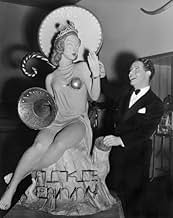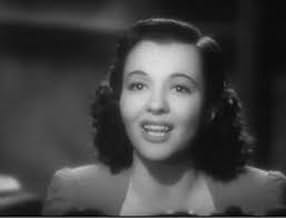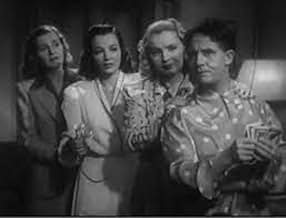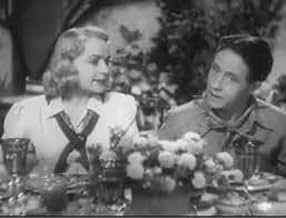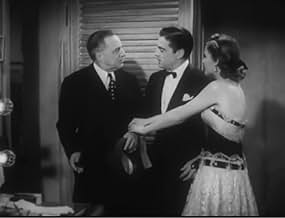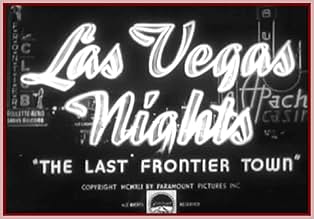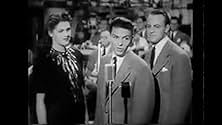AVALIAÇÃO DA IMDb
5,2/10
169
SUA AVALIAÇÃO
Adicionar um enredo no seu idiomaA vaudeville act inherits an old, beat-up building and decides to try to turn it into a hip new nightclub.A vaudeville act inherits an old, beat-up building and decides to try to turn it into a hip new nightclub.A vaudeville act inherits an old, beat-up building and decides to try to turn it into a hip new nightclub.
- Indicado a 1 Oscar
- 1 indicação no total
Tommy Dorsey & His Orchestra
- Tommy Dorsey and His Orchestra
- (as Tommy Dorsey His Trombone and His Orchestra)
William 'Red' Donahue
- Red Donahue
- (as Red Donahue and His Mule 'Uno')
Billy Bletcher
- Horse
- (narração)
Carl Andre
- Horseman
- (não creditado)
Stanley Andrews
- Sheriff
- (não creditado)
Bobby Barber
- Waiter Who Gets Slapped
- (não creditado)
- Direção
- Roteiristas
- Elenco e equipe completos
- Produção, bilheteria e muito mais no IMDbPro
Enredo
Você sabia?
- CuriosidadesThis musical was Frank Sinatra's movie debut. His appearance, singing "I'll Never Smile Again" with Tommy Dorsey's band, was uncredited.
- ConexõesFeatured in My Music: The Big Band Years (2009)
- Trilhas sonorasDolores
(uncredited)
Music by Louis Alter
Lyrics by Frank Loesser
Performed in Spanish by "The Mexican Trio"
Performed by Bert Wheeler and the Tommy Dorsey & His Orchestra
Avaliação em destaque
Though many seem to view this now as a Dorsey/Sinatra effort, the top billed man in the film was Bert Wheeler, so he was the one the audiences were coming to see. The Wheeler/Woolsey partnership is now an acquired taste (thank you TCM for giving me the chance to acquire it!), though in the 30's they were one of the top ranked comedy duos. But their humor was more risqué than other teams of the times, so their films didn't get a chance to find new audiences through TV replay.
According to the filmography this is Bert Wheeler's second solo effort after the death of Woolsey. His role here has grown up a bit: he's now a married man instead of a young lover, but his charm still has the same boyish quality as in his previous films.
But the interesting thing for those who have seen the previous films is to note how much the writers here must have had Woolsey still in mind. Hank Ladd serves as Bert's foil in this film and tries to put his own stamp on the part by being slick and oily, but one can easily imagine Woolsey delivering the lines, and his style and timing fitting them better.
If you've seen many of the W/W films then you'll also notice the re-use of a number of their old routines, though Ladd isn't the partner in all of them. It's interesting to see them pop up, and note the alterations.
Wheeler has good chemistry with Virginia Dale, and also with Moore and Cornell. Their song "Mary Mary Quite Contrary" is a pleasure. And Dale's "Dove Dance" is a hoot (sic).
Connie Haines joined the Dorsey band at about the same time that Sinatra did. This may be her first film appearance: it predates anything else currently listed in IMDb. She's a charmer, singing (uncredited) on "The Trombone Man Is The Best Man In The Band".
.... Which tune also has the obligatory Buddy Rich solo.
No, not the best of Woolsey's work, nor particularly inspired Dorsey, but still pleasant enough viewing.
According to the filmography this is Bert Wheeler's second solo effort after the death of Woolsey. His role here has grown up a bit: he's now a married man instead of a young lover, but his charm still has the same boyish quality as in his previous films.
But the interesting thing for those who have seen the previous films is to note how much the writers here must have had Woolsey still in mind. Hank Ladd serves as Bert's foil in this film and tries to put his own stamp on the part by being slick and oily, but one can easily imagine Woolsey delivering the lines, and his style and timing fitting them better.
If you've seen many of the W/W films then you'll also notice the re-use of a number of their old routines, though Ladd isn't the partner in all of them. It's interesting to see them pop up, and note the alterations.
Wheeler has good chemistry with Virginia Dale, and also with Moore and Cornell. Their song "Mary Mary Quite Contrary" is a pleasure. And Dale's "Dove Dance" is a hoot (sic).
Connie Haines joined the Dorsey band at about the same time that Sinatra did. This may be her first film appearance: it predates anything else currently listed in IMDb. She's a charmer, singing (uncredited) on "The Trombone Man Is The Best Man In The Band".
.... Which tune also has the obligatory Buddy Rich solo.
No, not the best of Woolsey's work, nor particularly inspired Dorsey, but still pleasant enough viewing.
- t1z2f
- 10 de jul. de 2008
- Link permanente
Principais escolhas
Faça login para avaliar e ver a lista de recomendações personalizadas
Detalhes
- Tempo de duração1 hora 30 minutos
- Cor
- Proporção
- 1.37 : 1
Contribua para esta página
Sugerir uma alteração ou adicionar conteúdo ausente

Principal brecha
By what name was Noites de Rumba (1941) officially released in India in English?
Responda
